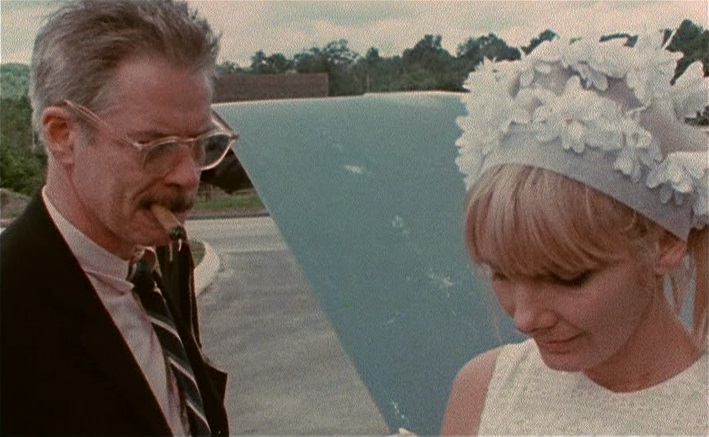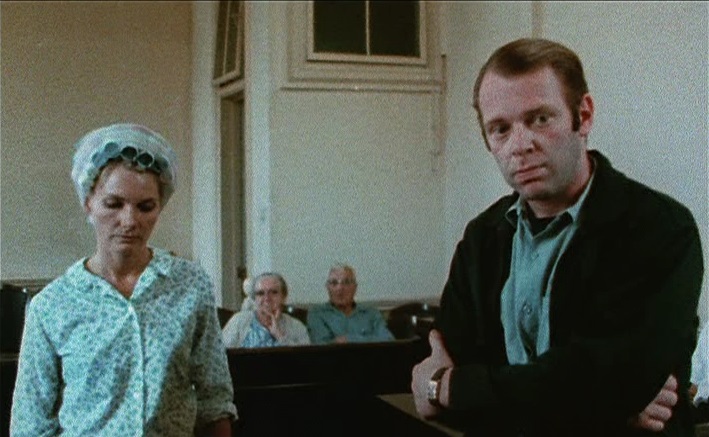The understated small-budget drama, billed as an anti-Bonnie and Clyde, will conclude the Cinematheque’s spring calendar on Sat
Even with the endorsement of John Waters and Isabelle Huppert, Barbara Loden’s uncompromising neo-realist masterpiece Wanda (1970) has yet to be formally reintroduced to audiences beyond the festival circuit. The local rental resources for the lost classic have been reduced to Four Star Video Cooperative and Netflix DVD for the decade-old, out-of-print Parlour Pictures edition. Here’s to the Cinematheque for reviving the film’s independent influence with a FREE presentation on 35mm this Sat at 7:00p in 4070 Vilas Hall.
Originally shot on 16mm, Wanda‘s grittiness is as beautifully unassuming as it is apparent in the muted aesthetic. At once liberating and distressingly veritable, it has drawn superficial comparison to more familiar American classics like Badlands (1973) and Buffalo ’66 (1998), but the film is more than a feminist riff on the likes of Bonnie and Clyde. Kate Taylor’s stirring New York Times profile of Loden accurately indicates how her own life experience inspired her first and only feature after she escaped an unstable Southern childhood to end up in New York as a pin-up model at sixteen in the late 1940s. After deservedly winning a Tony award in 1964 for acting in Arthur Miller’s After the Fall, she married renowned director Elia Kazan but tragically succumbed to breast cancer at age forty-eight.
Paralleling the framing of the industrial wasteland in Antonioni’s Red Desert (1964), the film’s opening long shot in the Eastern Pennsylvania coal excavation site utilizes distinct contrasts. A married woman (Loden) inhabits a setting where she feels unwanted, detached from a sense of normalcy, and oppressed beyond the bounds of her own understanding. Whether a lone distant drifter or static figure obscured in a crowd, Loden and DP Nicholas T. Proferes sympathetically highlight the motives and internal struggles of her character with acutely focused cinematography.
Wanda can ostensibly be described as a road movie in the physical distance it eventually traverses, but it is also one that soulfully wanders as the titular character searches for solace in the most unforgiving places, imitating others’ desires if only to feel a momentary accepting embrace. Sadly, the only “lasting” affection she receives from her victimizing environment is a product of Stockholm syndrome in her entanglement with the notoriously brutal bank bandit, Norman Dennis (played by the flat-topped/mustachioed Michael Higgins, whose immoderate behavior draws him ever closer in resemblance to fictitious newspaper editor J. Jonah Jameson from the Spider-Man universe).
After inadvertently passing a crime scene at a dive bar, Wanda is abducted, partially against her will and partially apathetically by Mr. Dennis, who proceeds to aggressively berate her over the pettiest matters. If there is a bit of humor in the stark dichotomy of his paranoid delusion to her calm innocence on the lam, the relationship dynamic quickly turns to a more sinister and broader commentary on traditional relationships. Their intensely abusive tryst reveals Wanda’s ongoing marginalization and urgent need to rebel; a hyper-masculinity threatens to collapse all facets of life, prominently peaking in Mr. Dennis’ plan to extort Third National Bank manager (Jack Ford)’s family while she serves as a conflicted hostage-accomplice (accurately both).
Feelings of pity and anger continue to manifest as the film thematically progresses with allusion to a religiously affiliated quote about divine judgment according to how we treat the most vulnerable among us. Not one individual makes a sincere attempt to understand or offer an alternative to Wanda in the patriarchal system where she always feels secondary to men. At the early divorce hearing, she shrugs and openly rejects the part of the dutiful wife, perhaps because she has never reciprocated romantic love. Yet, more than likely, Wanda understands the consequences of acquiescing and conforming. And so, in this emotional confusion, she lashes out by shirking responsibility, “bumming around drinking” as her husband John (Jerome Thier) puts it. The often quiet tumult in Wanda’s experiences bleeds into the psychology of the film itself, instilling it with a hypnotic, alluring tension and unusual rhythm that provokes one to reevaluate every subtle gesture.
- Wanda plays FREE on Sat, May 14, in 4070 Vilas Hall at 7:00p. The film is the finale to UW Cinematheque’s spring 2016 calendar as well as the “One and Done” series.


